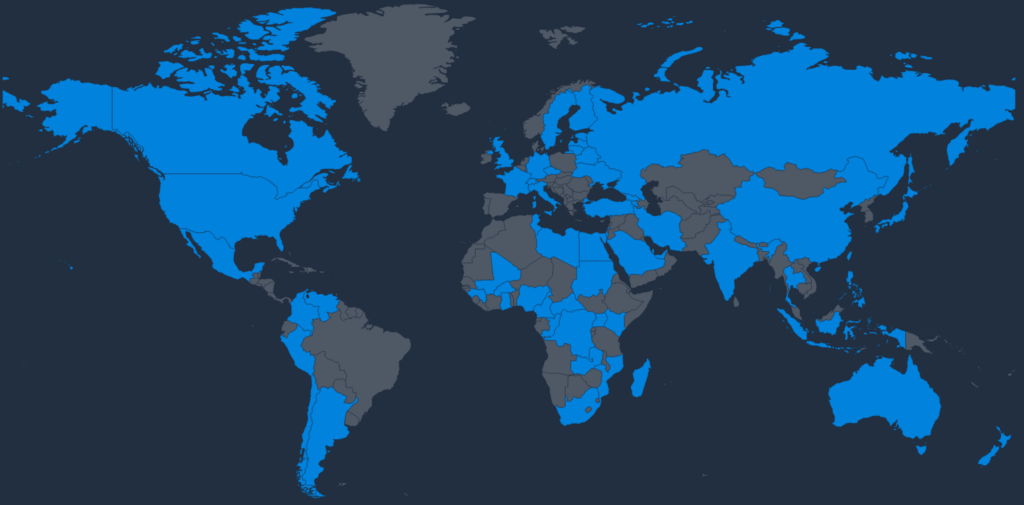Media and Information

Media and Information
Authoritarian influencers leverage propaganda, disinformation, censorship, and sway over content delivery systems to undercut the integrity of the information space.
Overview
State dominance over political expression and communication is a fundamental component of authoritarian control. Increasingly, authoritarian leaders that restrict media freedom and manipulate discourse in domestic settings also seek to curate information flows abroad as a form of modern censorship.

Digital-era changes to the information ecosystem have allowed narratives crafted by authoritarian regimes to gain traction far beyond their countries’ borders. Social media and the internet have lowered barriers to entry, enabling new actors to operate as information gatekeepers. Independent media outlets, meanwhile, have become increasingly vulnerable to economic coercion as they struggle to sustain themselves in an unfriendly business environment.
Sharp Power Influence
Authoritarian influencers take advantage of this already challenging information environment to flood the international media market with often coordinated, state-sponsored content:
- State media outlets that lack accountable and transparent governance structures—like RT (Russia Today), Sputnik, Press TV, CGTN, and Xinhua, among others—privilege authoritarian narratives and sideline independent perspectives.
- Content-sharing and coproduction agreements between state-backed and independent news outlets act as a conduit for insinuating regime-friendly content into local reporting.
- Journalist trainings and exchanges organized by authoritarian powers emphasize the regimes’ achievements and educate foreign journalists on how to report from the official perspective.
Authoritarians also employ trolling, online harassment, and forms of digital disinformation at scale to silence political dissent, shape election outcomes, and undermine democratic institutions. New technologies developed by a thriving commercial sector that offers disinformation as a service are used to demoralize, distract, and divide publics.
Information is a weapon—and one that can be used against us. This is an uncomfortable truth for open, democratic societies. We like to think that our media ecosystem is self-sustaining.
Democratic Responses
Civil society can counter authoritarian sharp power in the media and information space. Familiarity with how authoritarian powers influence the information circulating in print publications, radio broadcasts, television programs, and social media feeds is a crucial first step.
Norms and Standard Setting
- Media outlets should enhance operational transparency by publishing details about commercial relationships, acknowledging partnerships and information sources, and implementing procedures for receiving public complaints about inaccurate information.
- The media sector should resist authoritarian efforts to define the boundaries of free expression and association by affirming its commitment to democratic standards, like accountability and human rights, and letting these principles guide engagement with authoritarian actors.
Cross-Sector Collaboration
- Social media platforms should identify more meaningful ways to work with researchers, journalists, and civil society organizations, for example, to identify emerging threats and problematic accounts tied to authoritarian actors. Platforms should ensure that content producers and independent voices critical of authoritarian influence have an avenue for appeal when encountering online harassment or other censorship efforts.
- Democracy and rights-focused organizations should incorporate the specific challenges posed by authoritarian media influence into future initiatives, with coordination and support from funders.
Education and Awareness
- Civil society can help address persistent political-literacy gaps about modern forms of authoritarian influence. Surge capacity for local civil society expertise will help address sharp power inroads in established and emerging democracies alike.
- An understanding of authoritarian influence should be mainstreamed into nongovernmental work on media freedom, free expression, and internet freedom. A comprehensive mainstreaming strategy can build on existing initiatives and should include investigation and research, actions by media outlets, initiatives led by journalists’ unions and media owner associations, and civil society efforts.
Media and Information
The reporting and analysis catalogued in the Portal illustrates how authoritarian powers influence the media sector and information space in every region of the world.

Latest Resources
View All
Source: BNE Intellinews
Publication Date: September 30, 2024
Pro-Russian Politicians Step Up Propaganda Efforts ahead of Moldova’s EU Accession Referendum
Authoritarian Country: Russia
Affected Region: Europe, Moldova
Author: Iulian Ernst
Pro-Russian interference is growing ahead of two votes in Moldova. Maia Sandu’s national security adviser estimated that Russia will spend €100mn to interfere with the presidential elections and EU referendum. This interference includes bribes and replacing media closed for pro-Russian propaganda.
Source: Jerusalem Post
Publication Date: September 29, 2023
Sweden Accuses Iran of Targeted ‘Misinformation’ about Quran Burnings
Authoritarian Country: Iran, Russia
Affected Region: Europe, Sweden
Author: Seth J. Frantzman
Iran and Russia-backed disinformation campaigns have used recent Quran burnings to manipulate sentiments in Sweden. Fearing the effects of these malign efforts, the Swedish government has tasked its Agency for Psychological Defense with countering these campaigns.
Source: U.S. Department of State
Publication Date: September 28, 2023
How the People’s Republic of China Seeks to Reshape the Global Information Environment
Authoritarian Country: China
Affected Region: Global
The PRC has sought to shape the global information landscape in its favor through information manipulation, intimidation, co-opting journalists and enabling digital authoritarianism with cutting-edge technology.
Source: Center for European Policy Analysis
Publication Date: September 26, 2023
Moldova’s President Calls Out Russian Meddling
Authoritarian Country: Russia
Affected Region: Europe, Moldova
Author: Ahshish Kumar Sen
Moldova has sought support of the EU and international community to safeguard its democratic processes against Russian subversion. Russian tactics include election interference, disinformation, and economic blackmail.
![]() Source: Balkan Insight
Source: Balkan Insight
Publication Date: September 20, 2024
Orban’s Propaganda Campaign Against Ukraine Proves Surprisingly Effective
Authoritarian Country: Russia
Affected Region: Europe, Ukraine, Hungary
Author: Edit Inotai
As Hungarian President Victor Orban has drawn closer to Russian President Vladimir Putin, the anti-Ukrainian propaganda in Hungary has become louder. Since 2014, Russia has provoked interethnic conflict between Ukraine and Hungary through disinformation campaigns via online newspapers and posters.
![]() Source: Foreign Policy Research Institute
Source: Foreign Policy Research Institute
Publication Date: September 19, 2023
China’s Belt and Road Initiative: Politics Over Economics
Authoritarian Country: China
Affected Region: Global
Author: Felix K. Chang
China’s Belt and Road Initiative (BRI) has been expected to enter a new phase following the PRC’s Third BRI Forum in October 2023. With over 150 countries participating in the BRI, China’s plans for its signature initiative have appeared increasingly political and less focused on infrastructure development.

